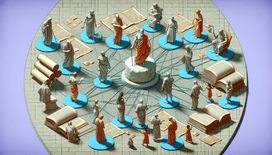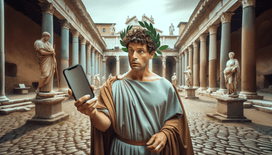Imagine, if you will, a world where Julius Cæsar, the illustrious Roman general, didn't just cross the Rubicon but also crossed the chasm of ancient communication by wielding the mighty power of Wi-Fi. Because let's face it, while Cæsar was certainly a pro at conquering vast swathes of Europe, his ancient parchment-based communication system left much to be desired. If only the struggle of crossing Gaul was as uncomplicated as connecting to a Starbucks hotspot! 🏛️📶
So strap on your caligae (those nifty Roman sandals), poly{italic}glance at that tunic with the toga draped perfectly, and prepare for a fabulously fun time warp, as we imagine what would've happened if the Roman legions had swapped out their standards for smartphones.
Rome Wasn't Built In a Day... But It Could Have Better Wi-Fi
Picture this – instead of receiving intelligence reports on hastily scribbled scrolls dispatched by runners prone to cramping in the midday sun, a Wi-Fi-enabled Cæsar has access to an instant messaging app called 'Squadron'. Notifications on his bronze tablet ping relentlessly, alerting him to gossip from the Senate, like, "@BrutusOfficial is looking rather suspicious today. #NotSussAtAll". And while crossing the Rubicon with his Pixel legionnaires, the comments section could light up with some dramatic meme-sharing: "#VeniVidiVici #WhatRubiconRestrictions?"
By Jove, That’s a Lot of Password Requests!
For a man well versed in tactics, Cæsar’s password management would need to be robust. We’re talking more intense than a wrestling match with Spartacus. Thanks to Wi-Fi, you can imagine him setting up the very first two-factor authentication, crouched behind a marble column, attempting to scroll some Papyrus-like equivalent to "Cæsar's Dayplanner & Protector of Passwords" while trumpets blast an endless loop of the Roman theme tune.
"Crossing the Raspberry Pi-Rubicon" would’ve been less mystique and more mesh-network marvel. Commanders could access real-time updates akin to a virtual Roman forum – "New Gaul territories available, click to purchase!" and "Current gladiator popularity map: Check if your local amphitheatre has seats available for next week’s games!"
Cæsar's Column of Contents
Of course, you’re aware that Rome's heaviest load was its Senate politics (such drama, darling!). Enter the Wi-Fi-driven political drama, a live-streamed mob dishing sectrum-fuelled burn notices. Rome's busiest bodies would breathe through forums more thrilling than a Roman circus – one where you could "like" Cato's speeches or add "bravo" emojis to particularly clever senatorial quips.
While it may sound like satire more delightful than an audience with Nero (before he picked up his first musical instrument), such a scenario would likely pour electronic streams of ambition into Cæsar's reforms, finally converting his assassination into a viral cliffhanger ("to be continued tomorrow at your next coliseum event!").
Crowning Connectivity
Of all the absurd greatness we could imagine, the true beauty of Wi-Fi in Cæsar's Rome lies not in the pizzazz of instant messaging or security protocols. No, it's the connectivity, as intangible as the soul of Rome itself, that spans continents, binding legions with a virtual camaraderie that traverses both time and space.
Just think of the notifications: "Hear me, Romans: Gaul conquest complete! Wi-Fi range weak in North Africa, issues escalating! @PompeyYourEnemy is online."
The legions, mightier as they virtually unite across the Republic – a digital legacy of order, keeping the motley crew that is Rome connected, from sleepy Londinium all the way to mesmeric Alexandria. Perhaps, even the Ides of March would have been preceded by a ping to remind our hero to perhaps take a detour via Appian Way – "PSA: Trust no one, not even your fellow senators today!"
So here we sit, chuckling solemnly yet mirthfully at what might have been. Each fallen emperor’s story echoing like emails from SPQR addresses, resonating through history’s inbox, all thanks to a wonderous dream of Wi-Fi to bind Rome closer than ever. 🌐🏺📲







